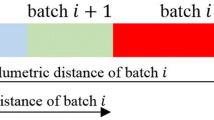Abstract
Ship scheduling problem is an important operational level planning problem in maritime logistics. In this paper, we show how we designed and developed a mathematical model for real-world tanker scheduling problem in Japan. Tanker operators own their fleet of tankers and make their schedules for the next several weeks for meeting customers’ demands. However, due to the high uncertainty of the ship operations and unexpected changes of demands, the schedules has to be revised frequently. Our methodology allows the operators to determine schedules that minimize the operational cost in a few minutes. These solutions provides cost improvements for tanker operators, as measured by reduction of 5–16%.
Similar content being viewed by others
References
Ronen D.: Cargo ships routing and scheduling: survey of models and problems. Eur. J. Oper. Res. 12, 119–126 (1983)
Ronen D.: Ship scheduling: the last decade. Eur. J. Oper. Res. 81, 325–333 (1993)
Christiansen M., Fagerholt K., Ronen D.: Ship routing and scheduling: status and perspectives. Transp. Sci. 38, 1–18 (2004)
Brown G.G., Graves W., Ronen D.: Scheduling ocean transportation of crude oil. Manag. Sci. 33, 335–346 (1987)
Desrosiers J., Dumas Y., Solomon M.M., Soumis F.: Time constrained routing and scheduling. In: Ball, M.O., Magnanti, T.L., Monma, C.L., Nemhauser, G.L. (eds) Network Routing, Handbooks in Operations Research and Management Science, 8, Elsevier, Amsterdam (1995)
Fagerholt K., Christiansen M.: A combined ship scheduling and allocation problem. J. Oper. Res Soc. 51, 834–842 (2000)
Fagerholt K., Christiansen M.: A travelling salesman problem with allocation, time window and precedence constraints—an application to ship scheduling. Int. Trans. Oper. Res. 7, 231–244 (2000)
Appelgren L.H.: A column generation algorithm for a ship scheduling problem. Transp. Sci. 3, 53–68 (1969)
Appelgren L.H.: Integer programming methods for a vessel scheduling problem. Transp. Sci. 5, 64–78 (1971)
Desauliniers, G., Derosiers, J., Solomon, M.M. (eds.): Column Generation, GERAD 25th Anniversary Series, Springer, New York (2005)
Christiansen M., Fagerholt K.: Robust ship scheduling with multiple time windows. Nav. Res. Logist. 49(6), 611–625 (2002)
Al-Khayyal F., Hwang S.-J.: Inventory constrained maritime routing and scheduling for multi-commodity liquid bulk, Part I: Applications and model. Eur. J. Oper. Res. 176, 106–130 (2007)
Dantzig G.B., Wolfe P.: Decomposition principle for linear programs. Oper. Res. 8, 101–111 (1960)
Desrochers M., Soumis F.: A generalized permanent labelling algorithm for the shortest path problem with time windows. INFOR. 26, 191–212 (1988)
Dash Optimization: The Xpress-Optimizer. http://www.dashoptimization.com/
Author information
Authors and Affiliations
Corresponding author
About this article
Cite this article
Kobayashi, K., Kubo, M. Optimization of oil tanker schedules by decomposition, column generation, and time-space network techniques. Japan J. Indust. Appl. Math. 27, 161–173 (2010). https://doi.org/10.1007/s13160-010-0008-7
Received:
Revised:
Published:
Issue Date:
DOI: https://doi.org/10.1007/s13160-010-0008-7




